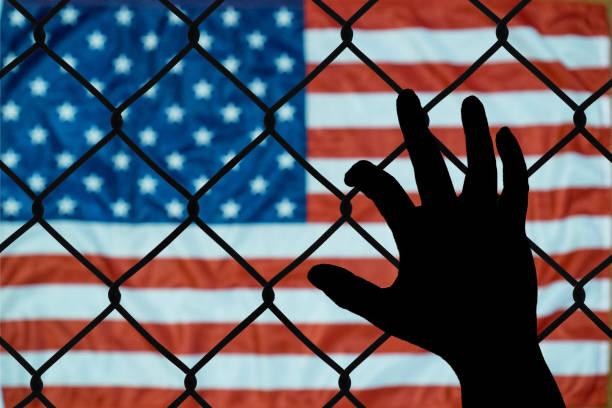On October 16th, the Department of Homeland Security (DHS) announced the implementation of a new fee of $1,000 for illegal aliens who have received parole in the US. This fee will undoubtedly cause substantial financial hardship for those affected. With immigration policy constantly shifting, it is essential for people to stay informed about new policies and keep up to date on these changes. For the first time, individuals granted immigration parole must pay a $1,000 fee — but what does that really mean?
What Is Immigration Parole?
Immigration parole is a temporary permission that grants entry into America if justified by severe circumstances or if found to be in the best interest of the general public. The Immigration and Nationality Act (INA) allows the Secretary of Homeland Security, as well as U.S. Citizenship and Immigration Services (USCIS), U.S. Customs and Border Protection (CBP), and U.S. Immigration and Customs Enforcement (ICE), to exercise discretion when granting these authorizations.
The most common forms of immigration parole include:
- Advance parole allows certain noncitizens with pending immigration applications to travel abroad temporarily and return to the U.S. without losing their status. It’s typically granted to those awaiting a green card decision, with pending asylum cases, needing urgent travel for personal reasons, or holding Temporary Protected Status (TPS).
- Humanitarian parole allows individuals to enter the U.S. temporarily for urgent humanitarian reasons, such as receiving critical medical care, donating an organ, visiting or caring for a sick relative, attending a funeral, or seeking protection from harm. USCIS considers how time-sensitive the situation is and the potential suffering if parole isn’t granted.
- Parole in place allows certain undocumented family members of U.S. military personnel to stay lawfully in the United States for one year at a time. It’s available to the spouse, widow(er), parent, son, or daughter of an active-duty service member, someone in the Selected Reserve, or a veteran who was not dishonorably discharged.
What Is The New $1,000 Parole Fee?
The Department of Homeland Security (DHS) is implementing a new $1,000 immigration parole fee, effective October 16, 2025, as required under the H.R. 1 Reconciliation Bill. The fee applies to each individual granted parole or re-parole in the United States, unless specifically exempt. U.S. Citizenship and Immigration Services (USCIS) will collect the fee from individuals applying for or renewing parole, and no parole will be issued without payment.
According to DHS, the fee is intended to offset administrative and vetting costs associated with the parole process and is part of a broader federal effort to align immigration program funding with actual operational expenses.
Who Is Affected?
The new $1,000 parole fee applies to any noncitizen granted parole or re-parole in the United States, regardless of immigration status or country of origin. According to the Federal Register, this includes individuals applying for initial parole under programs such as humanitarian or family reunification initiatives, as well as those seeking re-parole to extend their stay. The fee also affects participants in country-specific parole programs — including Cuban, Haitian, Afghan, and Ukrainian nationals — and may indirectly impact sponsors or petitioners involved in these processes.
However, the rule does not apply to individuals using advance parole (such as adjustment-of-status applicants) or certain military parole in place cases. While DHS has indicated that the fee is intended to recover administrative costs, advocates note that it could pose a significant financial burden on immigrants and families who may already face economic hardship.
Why Is It Being Implemented?
While the new parole fee has sparked controversy, it aligns with the Trump Administration’s broader efforts to tighten immigration policy and reduce the use of parole authority. The administration has framed the change as part of an effort to restore what it views as integrity and oversight to the immigration system.
In announcing the rule, DHS Assistant Secretary Tricia McLaughlin stated: “The Biden Administration abused America’s immigration system and turned parole into a de facto amnesty program, thereby allowing millions of unvetted illegal aliens into the U.S., no questions asked, to the detriment of all Americans.”
The statement reflects the administration’s position that the fee is intended to discourage what it considers the overuse of parole programs and ensure greater accountability in how temporary entry is granted.
What This Means For Immigrants
The new $1,000 parole fee marks a significant shift in U.S. immigration policy, raising questions about fairness, access, and how immigrant rights are recognized in practice. After all, statistics show that immigrants have substantially strengthened our economy, and claims linking immigration to higher crime rates remain unsupported by evidence. While parole has always been a discretionary benefit, it remains an important humanitarian pathway for those in urgent need, and the Constitution guarantees basic protections to all persons within the United States, regardless of status.
For those affected by the new fee, it’s essential to stay informed and seek reliable guidance. Applicants should follow USCIS updates, check whether exemptions apply, and consult an immigration attorney or accredited representative before filing. Community legal aid groups can also help those facing financial or legal challenges as this policy takes effect.


No Comment